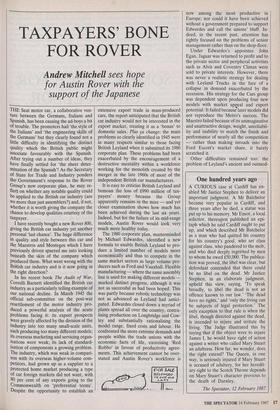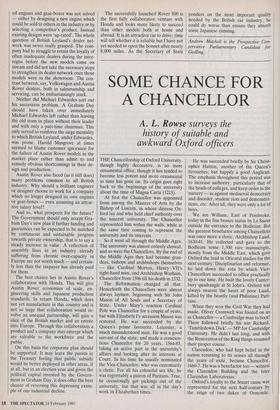TAXPAYERS' BONE FOR ROVER
Andrew Mitchell sees hope
for Austin Rover with the support of the Japanese
THE Seat motor car, a collaborative ven- ture between the Germans, Italians and Spanish, has been causing the ad-boys a bit of trouble. The promoters hail 'the style of the Italians' and 'the engineering skills of the Germans' but they clearly found not a little difficulty in identifying the distinct quality which the British public might associate favourably with the Spanish. After trying out a number of ideas, they have finally settled for 'the sheer deter- mination of the Spanish'! As the Secretary of State for Trade and Industry ponders the Government's response to the Rover Group's new corporate plan, he may re- flect on whether any notable quality could be applied to the British car industry (are we more than just assemblers?) and, if not, whether it is worth giving the company the chance to develop qualities courtesy of the taxpayer.
I have recently bought a new Rover 800, giving the British car industry yet another personal 'last chance'. The huge difference In quality and style between this car and the Maestros and Montegos which I have previously driven spurred me into looking beneath the skin of the company which produced them. What went wrong with the British car industry and is it now going in the right direction?
In his recent book The Audit of War, Correlli Barnett identified the British car industry as a particularly telling example of our national decline. In March 1945 the official sub-committee on the post-war resettlement of the motor industry pro- duced a powerful analysis of the acute problems facing it: its export prospects were gravely affected by the division of the industry into too many small-scale units, each producing too many different models; its overseas marketing and servicing organ- isations were weak; its lack of standard- isation of components a growing problem. The industry, which was weak in compari- son with its overseas higher-volume com- petitors, had grown up as a supplier to a protected home market producing a type of car foreign markets did not want, with 80 per cent of any exports going to the Commonwealth on 'preferential terms'. Despite the opportunity to establish an extensive export trade in mass-produced cars, the report anticipated that the British car industry would not be interested in the export market, treating it as a 'bonus' to domestic sales. Plus ca change: the main problems so clearly identified in 1945 were in many respects similar to those facing British Leyland when it submitted its 1980 corporate plan. These problems had been exacerbated by the encouragement of a destructive mentality within a workforce working for the monolith created by the merger in the late 1960s of most of the independent British car manufacturers.
It is easy to criticise British Leyland and bemoan the loss of £990 million of tax- payers' money because the Group apparently remains in the mire — and yet closer examination shows how much has been achieved during the last six years. Indeed, but for the failure of its mid-range models, Austin Rover would look very much more healthy today.
The 1980 corporate plan, masterminded by Michael Edwardes, identified a new formula to enable British Leyland to pro- duce a limited number of models more economically and thus to compete in the same market sectors as large volume pro- ducers such as Ford and Vauxhall. Flexible manufacturing — where the same assembly line is used for making different models marked distinct progress, although it was not as successful as had been hoped. This was partly because robotic technology was not as advanced as Leyland had antici- pated. Edwardes closed down a myriad of plants spread all over the country, centra- lising production on Longbridge and Cow- ley and substantially rationalising the model range, fixed costs and labour. He confronted the more extreme demands and people within the trade unions with the economic facts of life, exorcising 'Red Robbo' in favour of productivity agree- ments. This achievement cannot be over- stated and Austin Rover's workforce is now among the most productive in Europe; nor could it have been achieved without a government prepared to support Edwardes and call the unions' bluff. In- deed, in the recent past, attention has rightly focused on the problems of senior management rather than on the shop-floor.
Under Edwardes's appointee John Egan, Jaguar was returned to profit and to the private sector and peripheral activities such as Alvis and Coventry Climax were sold to private interests. However, there was never a realistic strategy for dealing with Leyland Trucks in the face of a collapse in demand exacerbated by the recession. His strategy for the Cars group was dependent upon producing four new models with market apReal and export potential. It failed because later models did not reproduce the Metro's success. The Maestro failed because of its unimaginative and unattractive design, weight, unreliabil- ity and inability to match the finish and performance of nearly all the competition — rather than making inroads into the Ford Escort's market share, it barely scratched it.
Other difficulties remained too: the problem of Leyland's ancient and outmod- ed engines and gear-boxes was not solved — either by designing a new engine which could be sold to others in the industry or by selecting a competitor's product. Instead existing designs were 'up-rated'. The whole question of British Leyland's dealer net- work was never really grasped. The com- pany had to struggle to retain the loyalty of often inadequate dealers during the inter- regna before the new models came on stream and did not take the necessary steps to strengthen its dealer network once those models were in the showroom. The con- trast between, say, Volkswagen and Austin Rover dealers, both in salesmanship and servicing, can be embarrassingly stark.
Neither did Michael Edwardes sort out his succession problem. A Graham Day should have taken over immediately Michael Edwardes left rather than leaving the old team in place without their leader and with only a part-time chairman. This only served to reinforce the siege mentality to which British Leyland, under Edwardes, was prone. Harold Musgrove at times seemed to blame customer ignorance for the failure of Austin Rover models in the market place rather than admit to and remedy obvious shortcomings in their de- sign and production.
Austin Rover also faced (as it still does) many problems common to all British industry. Why should a brilliant engineer or designer choose to work for a company which no longer designed its own engines or gear-boxes — even assuming an attrac- tive salary level?
And so, what prospects for the future? The Government should only accept Gra- ham Day's new plan if further funding and guarantees can be expected to be matched by continuous and sustainable progress towards private ownership, that is to say a steady increase in value. A collection of assembly lines in an industry already suffering from chronic over-capacity in Europe are not worth much — and certain- ly less than the taxpayer has already paid for them.
The best chance lies in Austin Rover's collaboration with Honda. This will give Austin Rover economies of scale, en- gineering skills and Japanese production standards. In return Honda, which does not yet manufacture in this country and is not so large that collaboration would in- volve an unequal partnership, will gain a slice of the British market and an entrée into Europe. Through this collaboration a product and a company may emerge which are saleable to the workforce and the public.
On this basis the corporate plan should be supported. It may leave the purists in the Treasury feeling that public subsidy would be better deployed in other areas, if at all, but in an election year and given the political capital invested by the Govern- ment in Graham Day, it does offer the best chance of reversing this depressing exam- ple of our industrial decline. The successfully launched Rover 800 is the first fully collaborative venture with Honda and looks more likely to succeed than other models both at home and abroad. It is an attractive car to drive; time will tell whether it is reliable but I have not yet needed to open the bonnet after nearly 8,000 miles. As the Secretary of State ponders on the most imporant quality needed by the British car industry, he could do worse than ensure they absorb some Japanese cunning.
Andrew Mitchell is the Prospective Con- servative Parliamentary Candidate for Gedling.



























































 Previous page
Previous page